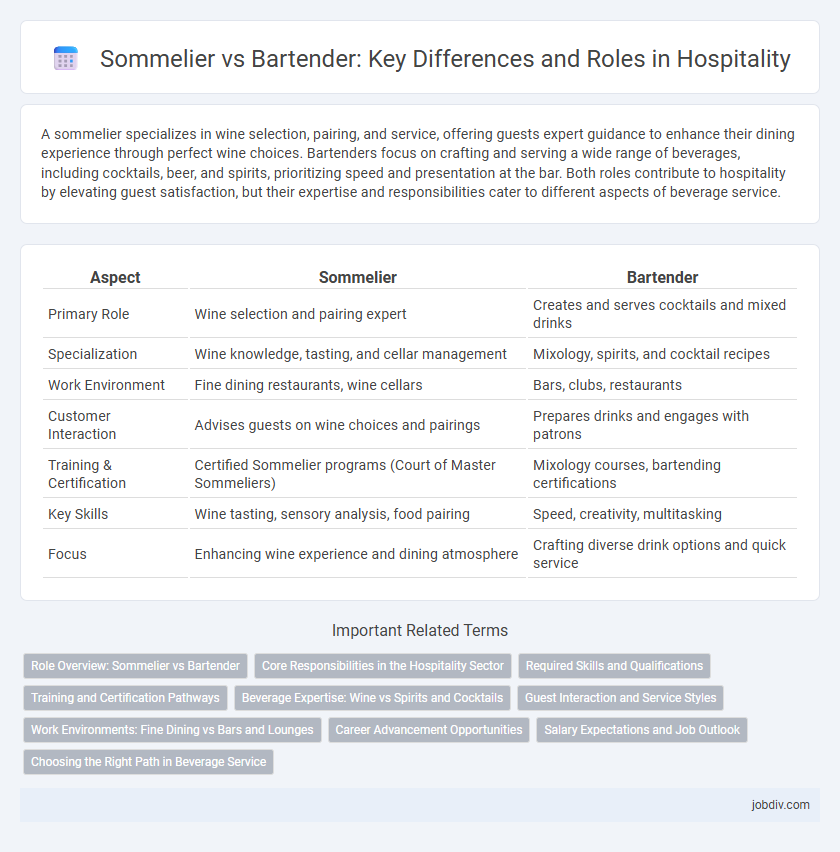A sommelier specializes in wine selection, pairing, and service, offering guests expert guidance to enhance their dining experience through perfect wine choices. Bartenders focus on crafting and serving a wide range of beverages, including cocktails, beer, and spirits, prioritizing speed and presentation at the bar. Both roles contribute to hospitality by elevating guest satisfaction, but their expertise and responsibilities cater to different aspects of beverage service.
Table of Comparison
| Aspect | Sommelier | Bartender |
|---|---|---|
| Primary Role | Wine selection and pairing expert | Creates and serves cocktails and mixed drinks |
| Specialization | Wine knowledge, tasting, and cellar management | Mixology, spirits, and cocktail recipes |
| Work Environment | Fine dining restaurants, wine cellars | Bars, clubs, restaurants |
| Customer Interaction | Advises guests on wine choices and pairings | Prepares drinks and engages with patrons |
| Training & Certification | Certified Sommelier programs (Court of Master Sommeliers) | Mixology courses, bartending certifications |
| Key Skills | Wine tasting, sensory analysis, food pairing | Speed, creativity, multitasking |
| Focus | Enhancing wine experience and dining atmosphere | Crafting diverse drink options and quick service |
Role Overview: Sommelier vs Bartender
A sommelier specializes in wine service, offering expert advice on wine selection, pairing, and storage to enhance the dining experience in high-end restaurants. A bartender focuses on crafting and serving a wide range of alcoholic and non-alcoholic drinks, managing the bar area, and engaging with customers in various hospitality settings. Both roles require in-depth beverage knowledge, but the sommelier's expertise centers on wine, while the bartender handles a broader spectrum of drinks.
Core Responsibilities in the Hospitality Sector
Sommeliers specialize in wine selection, pairing, and cellar management, ensuring guests receive a curated and elevated dining experience through expert knowledge of vintages, regions, and flavor profiles. Bartenders focus on crafting diverse beverages, managing bar inventory, and delivering personalized service, blending ingredients to create cocktails that enhance social interactions and customer satisfaction. Both roles require keen sensory skills and hospitality acumen, but sommeliers emphasize viticulture expertise while bartenders prioritize mixology and drink presentation.
Required Skills and Qualifications
A sommelier requires in-depth knowledge of wine varieties, aging processes, and food pairings, often holding certifications from organizations such as the Court of Master Sommeliers or the Wine & Spirit Education Trust (WSET). Bartenders need a strong understanding of mixology, cocktail recipes, and customer service skills, typically acquired through hospitality training or bartending courses. Both roles demand excellent communication, a keen palate, and the ability to work efficiently under pressure in fast-paced environments.
Training and Certification Pathways
Sommeliers undergo rigorous training in wine theory, tasting, and service, often obtaining certifications from organizations like the Court of Master Sommeliers or the Wine & Spirit Education Trust (WSET). Bartenders typically receive practical mixology training and may acquire certification from bodies such as the International Bartenders Association (IBA) or local hospitality institutes. The sommelier pathway emphasizes deep knowledge of wines and pairings, while bartender certification prioritizes cocktail preparation techniques and customer service skills.
Beverage Expertise: Wine vs Spirits and Cocktails
A sommelier specializes in deep wine knowledge, including varietals, regions, vintages, and food pairings, enhancing the dining experience through expert wine service. In contrast, a bartender excels in the art of crafting and mixing spirits-based cocktails, mastering techniques, flavor profiles, and presentation to create diverse beverage offerings. Both roles require extensive beverage expertise but differ in their focus: sommeliers prioritize wine education and cellar management, while bartenders emphasize cocktail creativity and spirits proficiency.
Guest Interaction and Service Styles
Sommeliers specialize in personalized wine pairings and detailed knowledge of wine regions, enhancing guest interaction through tailored recommendations and educational experiences. Bartenders focus on crafting cocktails quickly and engaging guests with energetic, conversational service at the bar. Both roles require strong communication skills, but sommeliers emphasize refined, intimate service while bartenders deliver dynamic, social interactions.
Work Environments: Fine Dining vs Bars and Lounges
Sommeliers typically work in fine dining establishments where they curate extensive wine lists and provide expert pairings to enhance gourmet meals, emphasizing a refined and educational customer experience. Bartenders operate mainly in bars and lounges, crafting a wide range of cocktails and managing drink service in a faster-paced, social atmosphere. The distinct work environments shape their specialized skills, with sommeliers focusing on wine knowledge and cellar management, while bartenders emphasize mixology and customer engagement.
Career Advancement Opportunities
Sommelier roles offer specialized career advancement opportunities through certifications such as Court of Master Sommeliers, enhancing expertise in wine and beverage management. Bartenders can progress by developing mixology skills, gaining bar management experience, and exploring opportunities in high-end lounges or event catering. Both paths provide pathways to leadership roles, but sommeliers often access niche positions in fine dining and luxury hospitality environments.
Salary Expectations and Job Outlook
Sommeliers typically earn higher salaries than bartenders, with average annual incomes ranging from $50,000 to $70,000 depending on the establishment and experience, while bartenders earn between $25,000 and $40,000. The job outlook for sommeliers is strong in upscale restaurants and luxury hotels, driven by increasing consumer interest in wine and beverage expertise, whereas bartenders benefit from a steady demand in bars, clubs, and casual dining venues. Career advancement for sommeliers often leads to positions like beverage director or wine consultant, offering higher earning potential compared to the more entry-level trajectory commonly seen in bartending roles.
Choosing the Right Path in Beverage Service
A sommelier specializes in wine knowledge, pairing, and cellar management, ideal for professionals passionate about enhancing dining experiences with expert wine selections. Bartenders master the art of crafting cocktails, mixing drinks, and engaging guests at the bar, suitable for those who thrive in fast-paced, social environments. Choosing the right path depends on whether you prefer detailed wine expertise or dynamic beverage creativity in hospitality service.
Sommelier vs Bartender Infographic

 jobdiv.com
jobdiv.com